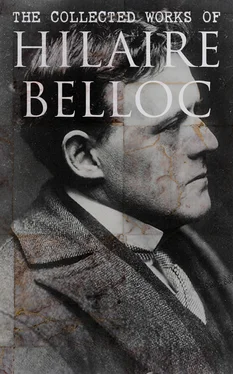I went into the cool of the cathedral to sit in its fine darkness and think better. I sat before a shrine where candles were burning, put up for their private intentions by the faithful. Of many, two had nearly burnt out. I watched them in their slow race for extinction when a thought took me.
'I will,' said I to myself, 'use these candles for an ordeal or heavenly judgement. The left hand one shall be for attempting the road at the risk of illness or very dangerous failure; the right hand one shall stand for my going by rail till I come to that point on the railway where one franc eighty will take me, and thence walking into Milan:--and heaven defend the right.'
They were a long time going out, and they fell evenly. At last the right hand one shot up the long flame that precedes the death of candles; the contest took on interest, and even excitement, when, just as I thought the left hand certain of winning, it went out without guess or warning, like a second-rate person leaving this world for another. The right hand candle waved its flame still higher, as though in triumph, outlived its colleague just the moment to enjoy glory, and then in its turn went fluttering down the dark way from which they say there is no return.
None may protest against the voice of the Gods. I went straight to the nearest railway station (for there are two), and putting down one franc eighty, asked in French for a ticket to whatever station that sum would reach down the line. The ticket came out marked Milan, and I admitted the miracle and confessed the finger of Providence. There was no change, and as I got into the train I had become that rarest and ultimate kind of traveller, the man without any money whatsoever-- without passport, without letters, without food or wine; it would be interesting to see what would follow if the train broke down.
I had marched 378 miles and some three furlongs, or thereabouts.
Thus did I break--but by a direct command--the last and dearest of my vows, and as the train rumbled off, I took luxury in the rolling wheels.
I thought of that other medieval and papistical pilgrim hobbling along rather than 'take advantage of any wheeled thing', and I laughed at him. Now if Moroso-Malodoroso or any other Non-Aryan, Antichristian, over-inductive, statistical, brittle-minded man and scientist, sees anything remarkable in one self laughing at another self, let me tell him and all such for their wide-eyed edification and astonishment that I knew a man once that had fifty-six selves (there would have been fifty-seven, but for the poet in him that died young)--he could evolve them at will, and they were very useful to lend to the parish priest when he wished to make up a respectable Procession on Holy-days. And I knew another man that could make himself so tall as to look over the heads of the scientists as a pine-tree looks over grasses, and again so small as to discern very clearly the thick coating or dust of wicked pride that covers them up in a fine impenetrable coat. So much for the moderns.
The train rolled on. I noticed Lombardy out of the windows. It is flat. I listened to the talk of the crowded peasants in the train. I did not understand it. I twice leaned out to see if Milan were not standing up before me out of the plain, but I saw nothing. Then I fell asleep, and when I woke suddenly it was because we were in the terminus of that noble great town, which I then set out to traverse in search of my necessary money and sustenance. It was yet but early in the afternoon.
What a magnificent city is Milan! The great houses are all of stone, and stand regular and in order, along wide straight streets. There are swift cars, drawn by electricity, for such as can afford them. Men are brisk and alert even in the summer heats, and there are shops of a very good kind, though a trifle showy. There are many newspapers to help the Milanese to be better men and to cultivate charity and humility; there are banks full of paper money; there are soldiers, good pavements, and all that man requires to fulfil him, soul and body; cafés, arcades, mutoscopes, and every sign of the perfect state. And the whole centres in a splendid open square, in the midst of which is the cathedral, which is justly the most renowned in the world.
My pilgrimage is to Rome, my business is with lonely places, hills, and the recollection of the spirit. It would be waste to describe at length this mighty capital. The mists and the woods, the snows and the interminable way, had left me ill-suited for the place, and I was ashamed. I sat outside a café, opposite the cathedral, watching its pinnacles of light; but I was ashamed. Perhaps I did the master a hurt by sitting there in his fine great café, unkempt, in such clothes, like a tramp; but he was courteous in spite of his riches, and I ordered a very expensive drink for him also, in order to make amends. I showed him my sketches, and told him of my adventures in French, and he was kind enough to sit opposite me, and to take that drink with me. He talked French quite easily, as it seems do all such men in the principal towns of north Italy. Still, the broad day shamed me, and only when darkness came did I feel at ease.
I wandered in the streets till I saw a small eating shop, and there I took a good meal. But when one is living the life of the poor, one sees how hard are the great cities. Everything was dearer, and worse, than in the simple countrysides. The innkeeper and his wife were kindly, but their eyes showed that they had often to suspect men. They gave me a bed, but it was a franc and more, and I had to pay before going upstairs to it. The walls were mildewed, the place ramshackle and evil, the rickety bed not clean, the door broken and warped, and that night I was oppressed with the vision of poverty. Dirt and clamour and inhuman conditions surrounded me. Yet the people meant well.
With the first light I got up quietly, glad to find the street again and the air. I stood in the crypt of the cathedral to hear the Ambrosian Mass, and it was (as I had expected) like any other, save for a kind of second _lavabo_ before the Elevation. To read the distorted stupidity of the north one might have imagined that in the Ambrosian ritual the priest put a _non_ before the _credo,_ and _nec's_ at each clause of it, and renounced his baptismal vows at the _kyrie;_ but the Milanese are Catholics like any others, and the northern historians are either liars or ignorant men. And I know three that are both together.
Then I set out down the long street that leads south out of Milan, and was soon in the dull and sordid suburb of the Piacenzan way. The sky was grey, the air chilly, and in a little while--alas!--it rained.
Lombardy is an alluvial plain.
That is the pretty way of putting it. The truth is more vivid if you say that Lombardy is as flat as a marsh, and that it is made up of mud. Of course this mud dries when the sun shines on it, but mud it is and mud it will remain; and that day, as the rain began falling, mud it rapidly revealed itself to be; and the more did it seem to be mud when one saw how the moistening soil showed cracks from the last day's heat.
Lombardy has no forests, but any amount of groups of trees; moreover (what is very remarkable), it is all cultivated in fields more or less square. These fields have ditches round them, full of mud and water running slowly, and some of them are themselves under water in order to cultivate rice. All these fields have a few trees bordering them, apart from the standing clumps; but these trees are not very high. There are no open views in Lombardy, and Lombardy is all the same. Irregular large farmsteads stand at random all up and down the country; no square mile of Lombardy is empty. There are many, many little villages; many straggling small towns about seven to eight miles apart, and a great number of large towns from thirty to fifty miles apart. Indeed, this very road to Piacenza, which the rain now covered with a veil of despair, was among the longest stretches between any two large towns, although it was less than fifty miles.
Читать дальше












